ROBERT WILLIAMS BUCHANAN (1841 - 1901)
|
ROBERT WILLIAMS BUCHANAN (1841 - 1901) |
|
|
|
|
|
|
|
|
What I did on my holidays. A Trip to Oban and Kirkintilloch with an introductory note (and two epilogues)
To begin at the end. In February, 2015, I received an email from Catherine Bull saying that she owned Soroba Lodge, Buchanan’s ‘White House on the Hill’, and she then sent me this photograph: |
 |
|
Catherine said that her house “is much further up the hill to where the farm cottage is and the hotel at the bottom” and the photo was taken “from the bottom of the hill, it can only be seen in winter when the trees are bare”. She added “if you had continued up past the b&b you may have seen a track with gates, this track runs approx. a mile up the hill to the lodge”. So, the following account of my attempt to find Buchanan’s house in Oban is rather redundant. I didn’t find it and made assumptions based on an old map and a census return which were totally wrong. The fact that I failed to see the Lodge I blame on the trees. I could have just deleted this page, or edited the account to hide my embarrassment, but then I’d lose some nice photos of Oban and, besides, it does serve as a warning, to myself as well as others, that the search for Buchanan is beset with obstacles and false trails. One should never succumb to the temptation to speculate. So, here it is, ‘What I did on my holidays. A trip to Oban and Kirkintilloch’ - my apologies to anyone who read it before I added this bit and on the strength of my ‘discovery’ made a pilgrimage to the Soroba Farm Cottage to pay obeisance to the shade of Buchanan - I jest. And, of course, many thanks to Catherine for setting me straight. _____
What I did on my holidays. A Trip to Oban and Kirkintilloch
In September, 2013, I took a trip to Scotland and spent a day in Oban looking for Robert Buchanan’s house. A few years ago I had done a little research via google and was convinced I’d found it, at least there was a Soroba House Hotel, with a website that mentioned Robert Buchanan living there - or at least that was how it stuck in my mind, and besides, how many white houses called Soroba were there in Oban? And if it wasn’t Buchanan’s house then, being a hotel, someone should know about the history of the area. So, a week before we set off (it was a family holiday and I’d only been allowed one day to do ‘Buchanan stuff’), I put ‘Soroba House Hotel’ in google to get the postcode for the satnav, only to find that it had closed down. The website had disappeared and I began to wonder whether it had said Buchanan had lived in that particular house, or whether it just meant he’d lived in the area. I emailed the Lorn Archaeological and Historical Society, and the Secretary, Joan Kemp, suggested I try the old maps of the area on the National Library of Scotland’s site. I found this one from 1927: |
 |
 |
|
There’s a hill behind it, but no discernible way up, apart from going through somebody’s back garden, but there’s nobody at home. So, back into the car and we drive on a bit and find one of those roads which look like they might be private. I leave the car and walk up. The first house is new, but I knock on the door - nobody home. Walk on a bit and come to this: |
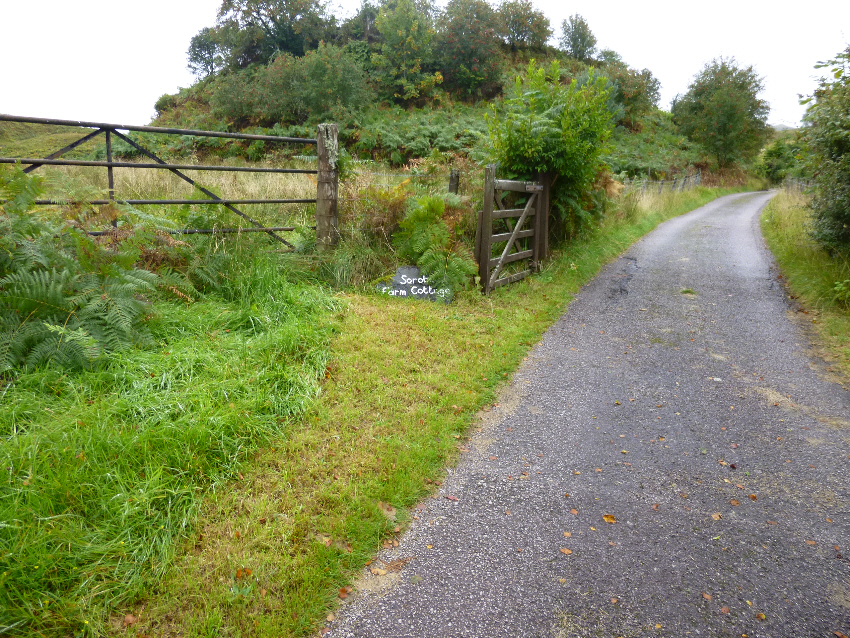 |
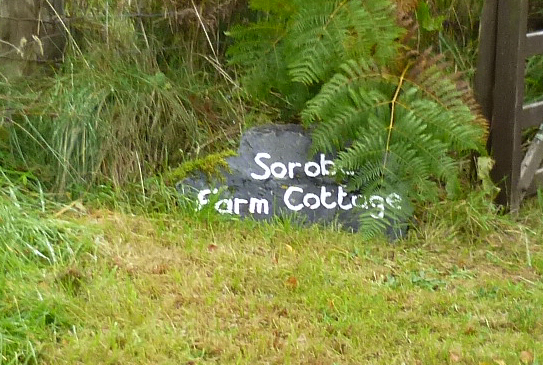 |
|||
|
And further up the road I finally find this: |
|||
 |
|
Now, hand on heart, I cannot be sure that this is where Buchanan lived. It is called Soroba [Farm] Cottage, it’s in the same place as the Soroba Cottage on the 1927 map, it is high on a hill, overlooking Oban (which you can’t see because the trees have grown), and it is painted white. Which all fit the descriptions of Harriett Jay’s ‘White House on the Hill’. It also looked to me (not an architect), ignoring the obvious renovations, as though it could have originally been built in the 19th Century. I did knock on the door (nobody in) and wandered round the back in case I could see any evidence of the 1870s. Then I panicked and wondered if Oban had got CCTV cameras and whether the police were on the way to investigate this suspicious character who was checking out all of these empty houses, looking through windows and wandering round their back gardens. So, I took a couple of photos of the views. Down to Oban (with trees): |
 |
|
And up beyond: |
 |
|
Then walked (rather quickly) back to the car and the waiting wife. We then went back to Oban ... |
 |
|
... and wandered round a bit before driving back to where we were staying in Stirling. I have to say there was no evidence in Oban of Robert Buchanan, which was as expected. I did make enquiries at the Tourist Office (silly foo’ me) and they suggested I try Waterstones. However, as we sat on a bench, watching the big ferry set off for the Western Isles, I did spot this boat in the harbour, which, given Buchanan’s The Outcast and his unproduced play, seemed a nice coincidence. |
 |
 |
|
Scary: |
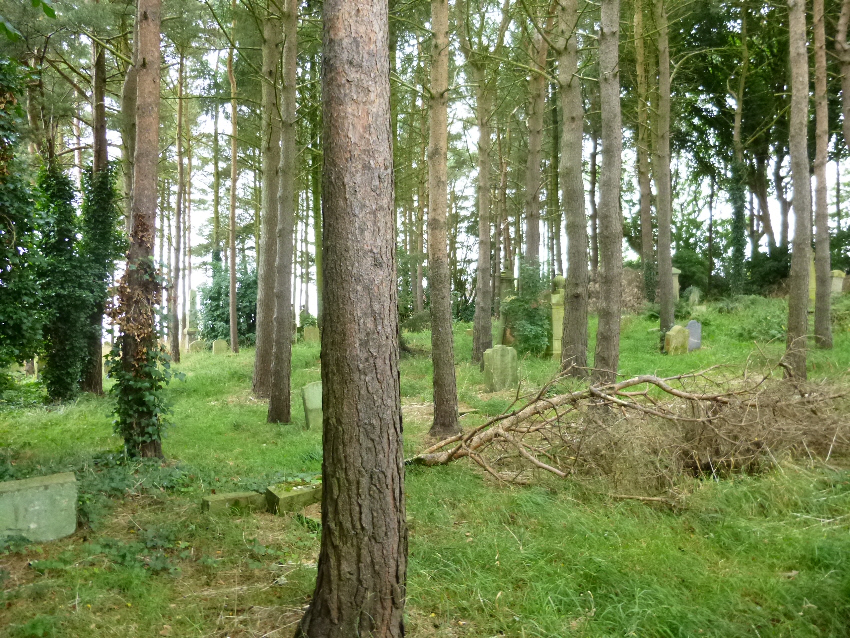 |
|
The grave of David Gray: |
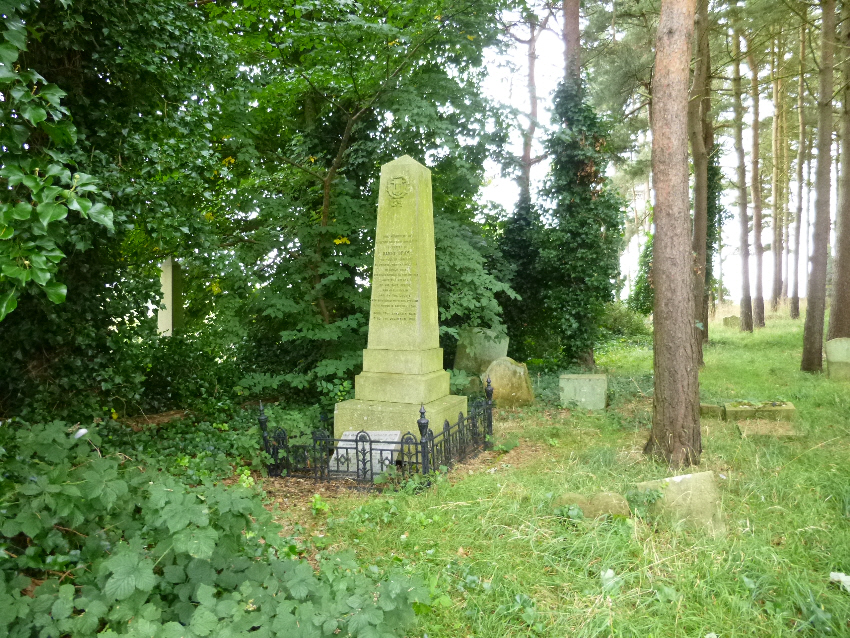 |
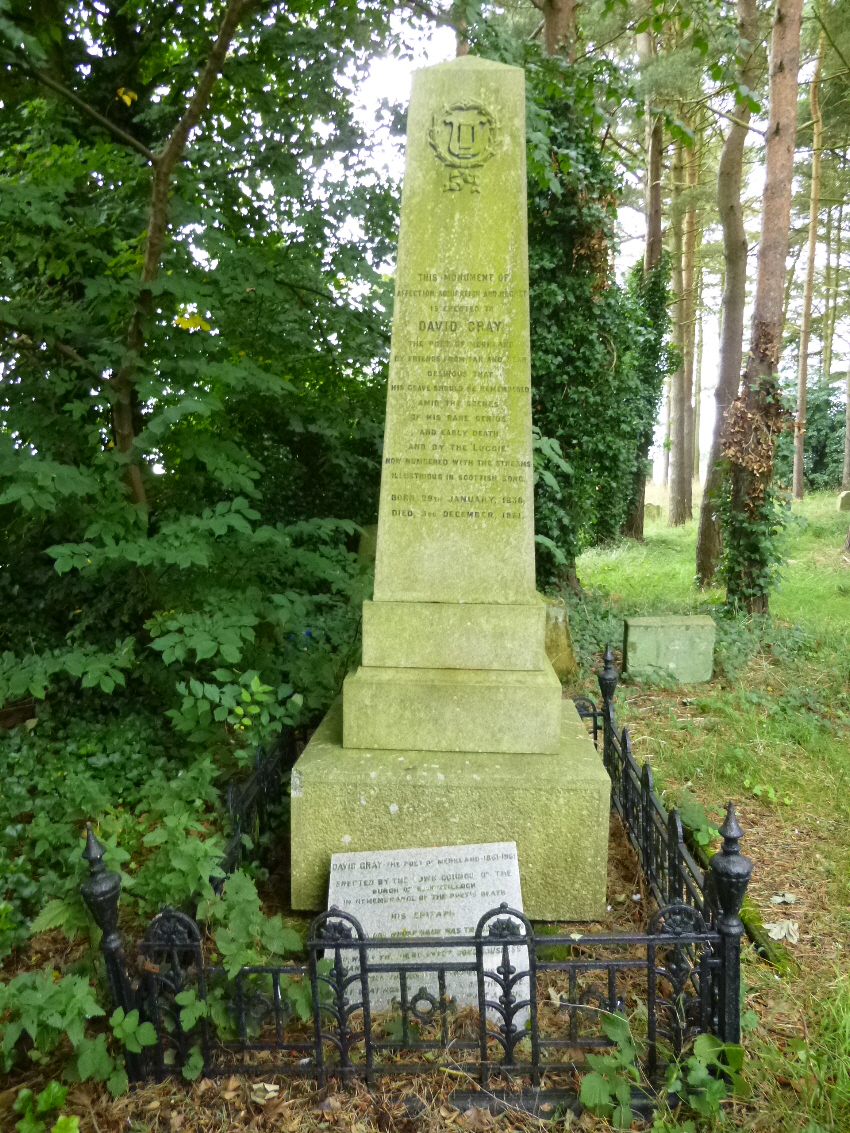 |
 |
|
The inscription, written by Lord Houghton: THIS MONUMENT OF DAVID GRAY THE POET OF MERKLAND BORN, 29TH JANUARY, 1838; |
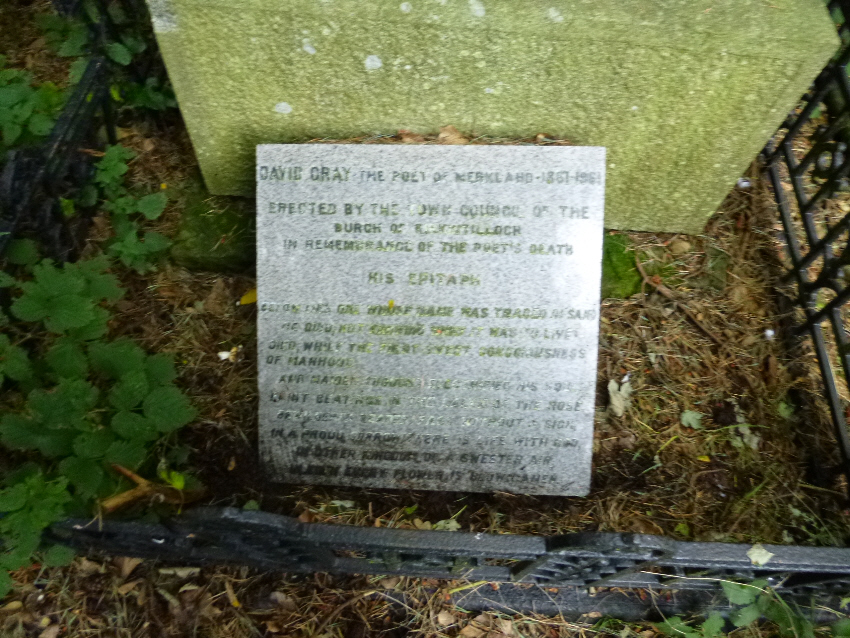 |
|
The plaque was, presumably, once attached to the monument. Now it just leans against it. The inscription reads: DAVID GRAY - THE POET OF MERKLAND - 1837-1861 ERECTED BY THE TOWN COUNCIL OF THE HIS EPITAPH BELOW LIES ONE WHOSE NAME WAS TRACED IN SAND
[In 2020, when I was adding some more information to the site about David Gray, I came across this item in The Glasgow Herald of 4th December, 1961, which I am assuming relates to the leaning plaque: |
|||
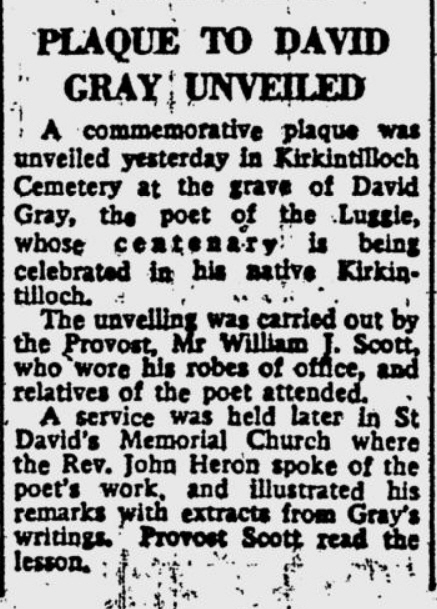 |
|||
|
Behind the grave: |
|||
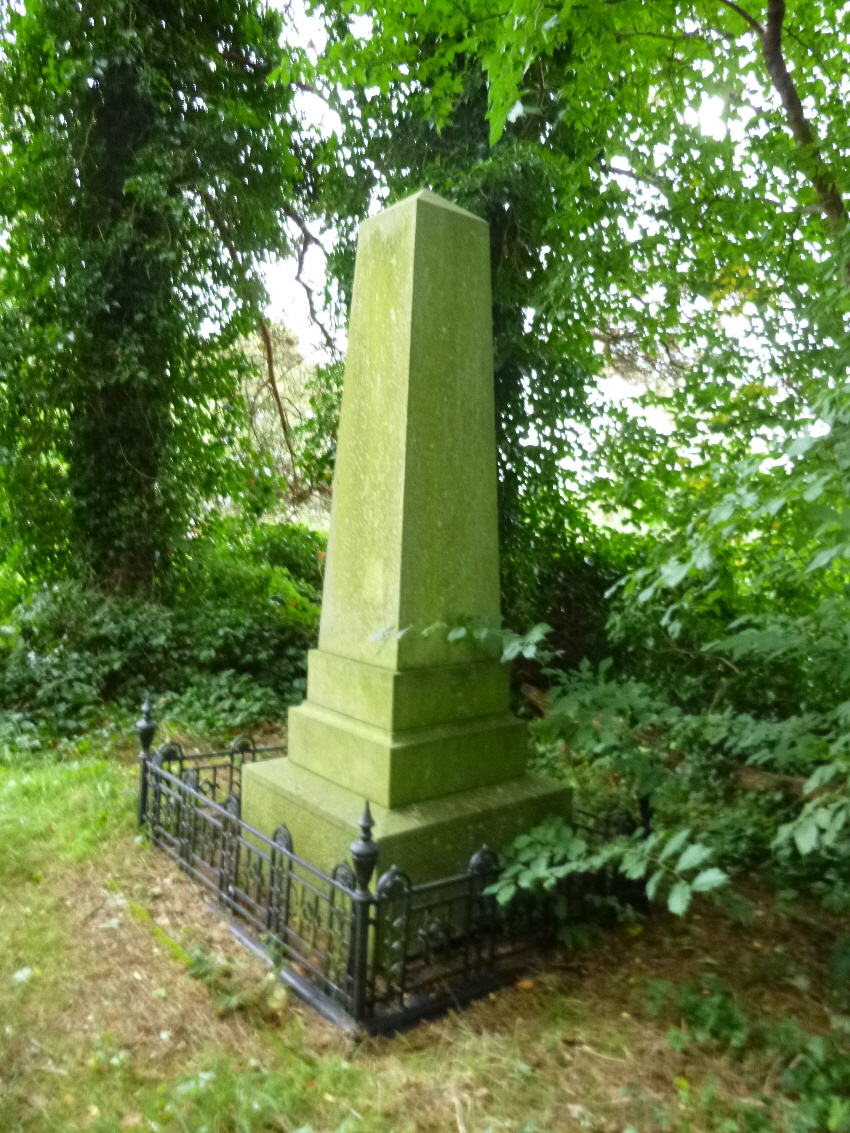 |
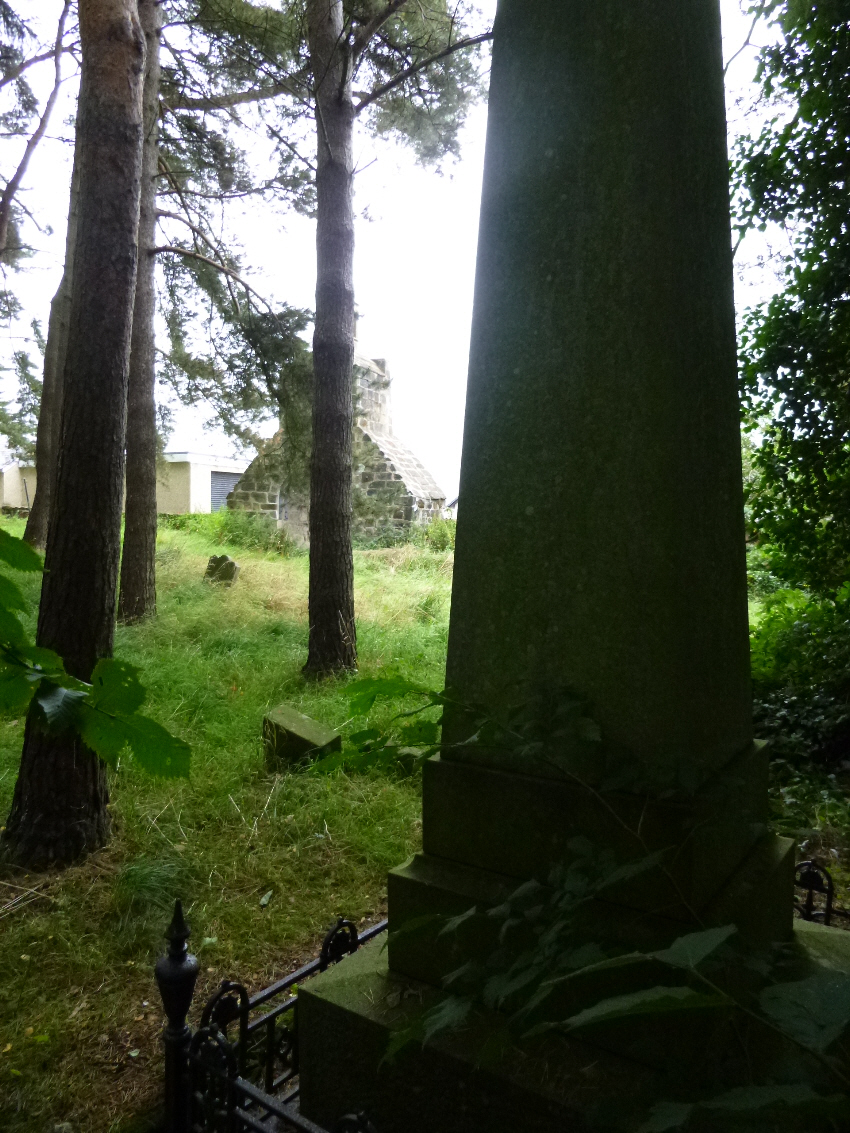 |
|
I also came across this video of David Gray’s grave on youtube. I didn’t think of doing one myself, seeing as how it doesn’t move about much. |
|||
|
In January 2016 I received another email from Catherine Bull to which were attached the following pages from An Old Oban Pictorial by Mrs. Agnes D. Black. |
|||
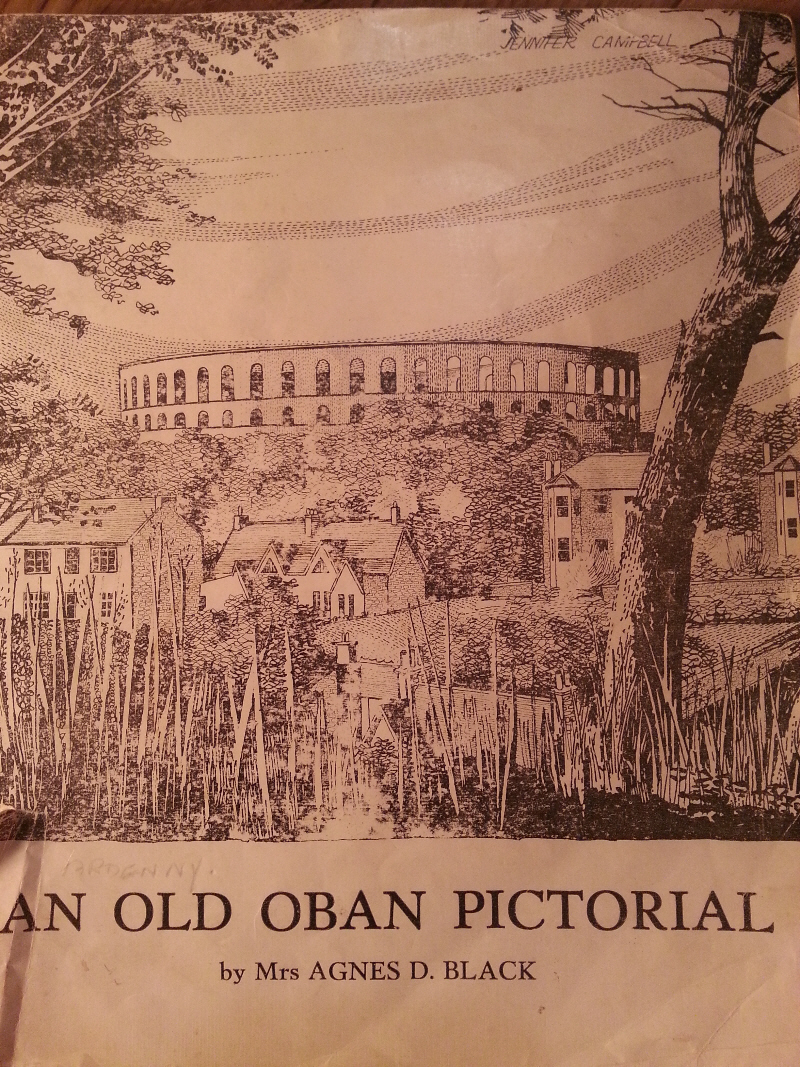 |
|||
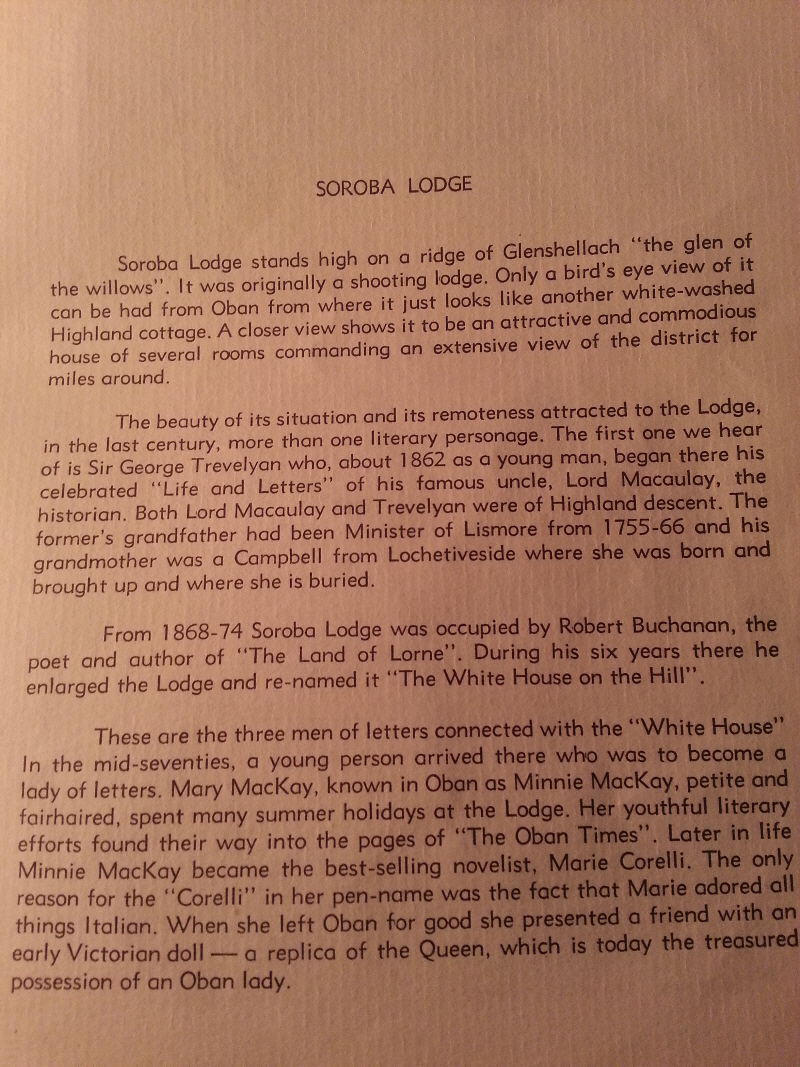 |
|||
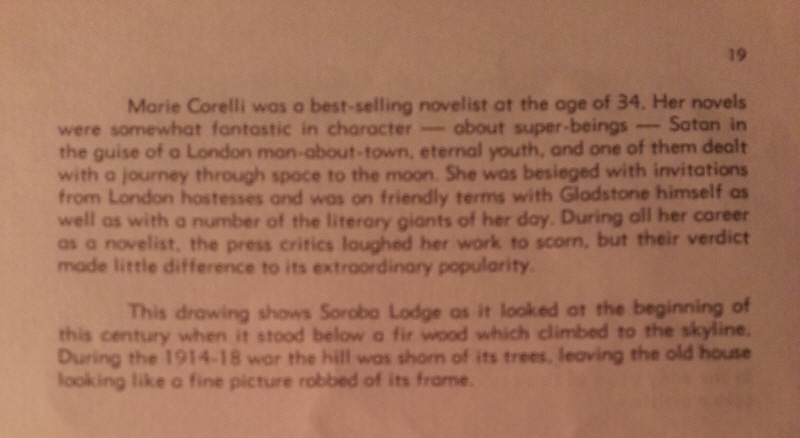 |
|||
 |
|
Catherine did point out that the additional artwork on the picture above was provided by her husband, when he was a lad (click the picture for a larger image). Aside from the drawing of Soroba Lodge, the most interesting revelation in these pages is the bit about Marie Corelli. I had no idea that the two authors shared a connection to Soroba Lodge. It is not mentioned in the three letters from Buchanan to Corelli which have survived in the Shakespeare Birthplace Trust, and it does not turn up in the following passage from Buchanan’s 1896 pamphlet, Is Barabbas a Necessity? ‘At the moment of issuing THE DEVIL’S CASE (which has been in type, by the way, for many months), I see that Miss Marie Corelli has written and published a new story called The Sorrows of Satan. Miss Corelli, using a very wise discretion, does not present her book to the Critics, but I have read one review of the work, and more recently the work itself, from which it appears that the Devil of a maiden imagination, so far from resembling the true and only Devil whom I interviewed on Hampstead Heath, is merely the sentimental yet wicked Lucifer so dear to Laura Matilda. He is, in short, the blasé, evening-party-haunting, and wholly superfine young ladies’ Devil of Lord Byron, Bulwer Lytton, and Satan-Montgomery, and has nothing in common with the great Original. I might have known, of course, that the author of Barabbas, who was content to swallow the whole camel of Christian thaumaturgy at one gulp, and who had pictured to us as genteel a Jesus as ever had “marble limbs” and Apollo-like proportions, would never write anything to give offence in the upper circles of society and religion; but when I saw the title of .her book I was a little afraid that I had been forestalled, and that the real Satan, forgetful of his pledge to me, had been powwowing at Earl’s Court with Miss Corelli, Mr. Gladstone, and the Prince of Wales. _____
Soroba Lodge (and again)
In 2016 Soroba Lodge was put on the market, and details are available on the Zoopla site. Although there are several photos of the interior, it seems a little intrusive to add them here, so here’s the exterior and the view of Oban from Soroba Lodge. |
 |
 |
|
|
|
|
|
|
|
|